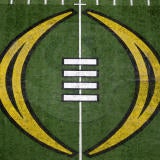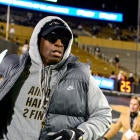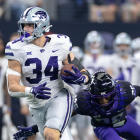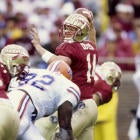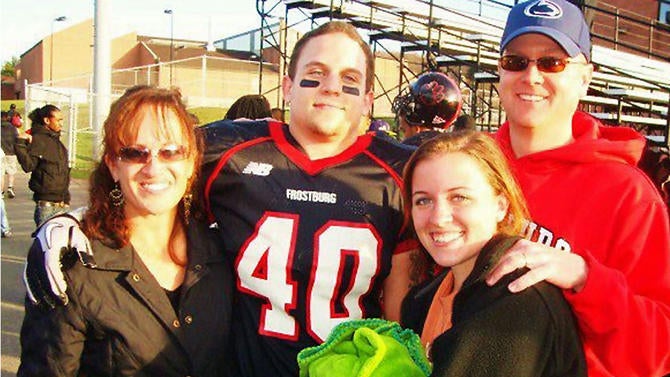
The NCAA and other co-defendants will pay $1.2 million to a foundation created for a Division III football player who died from a head injury, according to settlement terms released Monday.
Derek Sheely was a Frostburg State football player who collapsed during a 2011 practice after sustaining a head injury and later died. Two years later, his family sued the NCAA, two Frostburg State coaches, an athletic trainer and the helmet manufacturer. The family claimed the school employees missed multiple chances to treat Sheely's injury and the NCAA had responsibility by failing to implement concussion protocol rules or investigating his death.
The case was scheduled for a five-week trial in June before a settlement was reached. The settlement ends the lengthy lawsuit and leaves the deceased player's mother with mixed feelings as the five-year anniversary of her son's death approaches.
"It just seems as if the outcome we wanted will never be," said Kristen Sheely, Derek's mother. "I think any parent would realize that, but this helps us more than even the best possible verdict in a trial. This helps us with the foundation. We've said from the beginning it's never been about the money, but the money will help so many other kids."
Sheely attorney Kenneth McClain said the settlement is "landmark" because it's the first brain-injury case the NCAA has agreed to pay a "significant amount of money" to resolve. The case shows that "the stakeholders of football are now on notice that they have an obligation to protect the health and safety of the athletes, and if they fail to do so, there will be vast repercussions," McClain said in a statement.
Kristen Sheely said she believes $1.15 million of the settlement money is coming from the NCAA and the other $50,000 is from the state of Maryland, where Frostburg State is located. The NCAA declined to confirm its amount in the settlement.
Under terms of the agreement, the NCAA and Frostburg State will also provide a grant by 2018 to support a research project dealing with catastrophic risk. The Derek Sheely Foundation will be consulted on the research award project. The NCAA, Frostburg State and the Derek Sheely Foundation will sponsor a symposium by 2018 regarding catastrophic risks or head injuries.
"While the settlement acknowledges no admission of liability by the NCAA, the NCAA believes this settlement will help the foundation advance research and education in the prevention of traumatic brain injury," NCAA chief legal officer Donald Remy said in a statement. "As a leader in promoting enhanced safety in college sports, the NCAA is firmly committed to fostering greater understanding of student-athlete well-being."
In April, a Maryland judge denied summary judgment to the NCAA and said the type of injury that allegedly killed Sheely -- second-impact syndrome from multiple concussions -- is not a known inherent risk of playing football.
Second-impact syndrome occurs when the brain swells rapidly after a person suffers a second concussion before symptoms from an earlier one have subsided.
One of the NCAA's main arguments was it has no legal duty to protect athletes. If sports organizations were liable, the NCAA said all athletic associations would be subject to litigation any time a participant is injured in any sport for failure to prevent the injury. But in a sign of evolving opinions about concussions, Montgomery County Circuit Court Judge David Boynton determined the NCAA has a "special relationship" since its mission statement is to protect college athletes. Since second-impact syndrome is not an obvious risk of football, a legal duty to warn exists and a jury could hear the arguments, Boynton said.
"On the one hand, we wanted our day in court," Kristen Sheely said. "On the other hand, we knew the nightmare that we'd have to live with for five weeks. It's really the definition of dilemma. You have two bad choices: go to trial and risk losing, or settling."
A major concern was Maryland state law, "which terrified all of us," Kristen Sheely said. If the jury found that even 1 percent of Derek's death was his own fault, the Sheely family would lose.
The settlement allows Sheely's jersey to be retired by Frostburg State, something the family believes it never would have gotten through a verdict. Frostburg State will establish an annual campus fundraiser for the Derek Sheely Foundation and fund a full-tuition scholarship to a student in Sheely's honor for at least 10 years.
Sheely's case received national attention by Congress. At a Senate committee hearing in 2014 about college sports, the first question NCAA president Mark Emmert faced was the association's position in the Sheely case that it has no legal duty to protect athletes.
"I will not quibble about the language," Emmert replied. "I think that was at the very least a terrible choice of words created by legal counsel to make a legal argument. I'm not a lawyer. I'm not going to defend or deny what a lawyer wrote in a lawsuit. I will unequivocally state we have a clear moral obligation to make sure we do everything we can to protect and support student-athletes."
Since the lawsuit started, the Sheely family wanted to change how the NCAA handles head injuries and shift concussion protocol guidelines into enforceable rules with possible penalties. That didn't happen with the settlement, which states: "The NCAA will continue to discuss with its member institutions policies regarding guideline enforcement, concussion and second-impact syndrome training for coaches and trainers and elimination of certain drills."
Said Kristen Sheely: "I guess that's going to be a work in progress. You can have all the rules you want, but if you don't enforce them, they're useless. Any parent knows that. I don't know what it's going to take change things."
Frostburg State running backs coach Jamie Schumacher, who is no longer employed by the school, allegedly berated Sheely to keep practicing while hurt, even after he collapsed. According to accounts by teammates, Sheely went to a trainer four times over three days complaining of symptoms, including blood coming from his forehead, yet wasn't given a concussion test.
The Sheely family never understood how the NCAA can investigate players and coaches for impermissible benefits, but not when a player dies on the field.
"We wanted acknowledgment of what happened," Kristen Sheely said, fighting back tears. "We thought maybe at trial we'll finally find out the truth of what happened ... It's five years (since Derek's death) in a few weeks. We just couldn't imagine another year, two or three fighting for the truth (possibly on appeal) and fighting for our son and having people fight against us.
"Maybe in time we will view this as a relief. I can't say there's relief now. That's another word I don't know what that means anymore -- 'relief' and 'peace' and 'comfort', and things like that. We feel compelled to do something because this never should have happened. Derek was interrupted and we just can't sit idly by and watch another child go through the same fate and their family suffer like we have."










